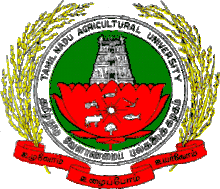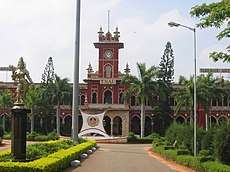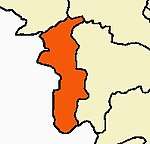Tamil Nadu Agricultural University
Tamil Nadu Agricultural University (TNAU) is an agricultural university located in Coimbatore, Tamil Nadu, India.
 Logo | |
| Type | Public |
|---|---|
| Established | 1906 |
| Chancellor | Governor of Tamil Nadu |
| Vice-Chancellor | Dr. N. KUMAR |
| Students | 7501 |
| Location | , , 641003 , 11.01236°N 76.93559°E |
| Website | www |

History
The Tamil Nadu Agricultural University had its genesis from establishment of an agricultural school at Chennai, Tamil Nadu, India, as early as 1868 which was later relocated at Coimbatore during 1906.
In 1920 it was affiliated to Madras University. TNAU assumed full responsibilities of Agricultural Education and Research and supported the State Agricultural Department by delivering research products. In 1958, it was recognised as a post-graduate centre and began to offer master's and doctoral degrees.
Academics
The university offers 13 undergraduate programs, 40 graduate programs and 27 doctoral programs.[1] As the university switched over to the e-learning from the academic year 2007, it was made compulsory for first-year students to procure personal laptops.[2] Apart from academic institutes, the University now has research programs at more than 32 stations, spread over in Tamil Nadu with more than 1200 scientists and teaching faculty.
Rankings
| University rankings | |
|---|---|
| General – international | |
| QS (BRICS) (2019)[3] | 130 |
Internationally, Tamil Nadu Agricultural University was ranked 130 among BRICS nations by the QS World University Rankings of 2019.[3]
Constituent colleges
The university has 15 constituent colleges:[4]
| No. | Name | Location | District | Estd | Status |
|---|---|---|---|---|---|
| 1 | Agricultural College and Research Institute, Coimbatore | Coimbatore | Coimbatore | 1908 | University Main Campus |
| 2 | School of Post Graduate Studies, Coimbatore | Coimbatore | Coimbatore | 1965 | University Main Campus |
| 3 | Agricultural College and Research Institute, Madurai | Madurai | Madurai | 1965 | University Main Campus |
| 4 | Anbil Dharmalingam Agricultural College and Research Institute | Navalur Kuttapattu | Tiruchirappalli | 1989 | University Constituent College |
| 5 | Agricultural College and Research Institute, Killikulam | Killikulam, Vallanadu | Thoothukudi | 1985 | University Constituent College |
| 6 | Agricultural Engineering College and Research Institute, Kumulur | Kumulur, Lalgudi | Tiruchirapalli | 1992 | University Constituent College |
| 7 | Agricultural Engineering College and Research Institute, Coimbatore | Coimbatore | Coimbatore | 1972 | University Constituent College |
| 8 | Horticultural College and Research Institute, Coimbatore | Coimbatore | Coimbatore | 1972 | University Constituent College |
| 9 | Horticultural College and Research Institute Periyakulam | Periyakulam | Theni | 1990 | University Constituent College |
| 10 | Horticultural College and Research Institute for Women | Navalur Kuttapattu | Tiruchirappalli | 2012 | University Constituent College |
| 11 | Forest College and Research Institute, Mettupalayam | Mettupalayam | Coimbatore | 1990 | University Constituent College |
| 12 | Home Science College and Research Institute, Madurai | Madurai | Madurai | 2000 | University Constituent College |
| 13 | Agricultural College & Research Institute, Eachankottai | Eachankottai | Thanjavur | 2014 | University Constituent College |
| 14 | Agricultural College & Research Institute, Valavachanur | Valavachanur | Thiruvannamalai | 2014 | University Constituent College |
| 15 | Agricultural College & Research Institute, Kudumiyanmalai | Kudimiyanmalai | Pudukkottai | 2014 | University Constituent College |
| 16 | Institute of Agriculture, Kumulur | Kumulur | Trichy | 2016 | University Constituent College |
Timeline
- 1868: Agricultural School was started at Saidapet, Chennai (Madras).
- 1906: The Saidapet Agricultural School was shifted to Coimbatore and foundation stone laid for Madras Agricultural College.
- 1908: Students were admitted to education program leading to Licentiate in Agriculture (L. Ag.)
- 1909: Opening of Agricultural College and Research Institute (AC & RI) by Sir Arthur Lawley.
- 1920: The AC & RI was affiliated to Madras University. A new course of study leading to a three-year degree in Agriculture -B.Sc. (Ag.) was started.
- 1945: Second Agricultural College was started at Bapatla (Now in Andhra Pradesh).
- 1958: Regional Post-Graduate Centre was established to offer programs leading to master's degree in Agriculture & Horticulture. In Annamalai university, Agriculture teaching started leading to award of M.Sc.(Ag)in Horticulture first of its kind in India.
- 1960: Integrated system with four year B.Sc. (Ag) degree program after pre-university education was introduced and subsequently doctoral programme in Agriculture was started.
- 1965: Third Agricultural College was started at Madurai, Tamil Nadu and the Masters program at Madurai was introduced during 1969.
- 1971: The Tamil Nadu Agricultural University came into existence with Coimbatore as its headquarters. The first vice chancellor Dr.G.Rengasamy was from ANNAMALAI UNIVERSITY which was having Faculty of Agriculture from 1958 onwards teaching agriculture and horticulture.
- 1972: A separate Faculty of Horticulture was established and a degree program in Horticulture - B.Sc. (Hort.) was introduced. The College of Agricultural Engineering was established at Coimbatore and a bachelor's degree program in Agricultural Engineering - B.E.(Ag) was introduced.
- 1973: Doctoral program was introduced in Horticultural College and Research Institute, Coimbatore.
- 1975: Faculty of Post Graduate Education was established in TNAU, Coimbatore and master's and doctoral (1978) programs were started in Environmental Sciences and Biotechnology.
- 1976: The Madras Veterinary College became constituent unit of TNAU and B.V.Sc. degree program was suitably restructured*.
- 1977: Bachelor's degree (B.F.Sc.) program in Fisheries Science at Thoothukudi was started*.
- Masters and doctoral program in Agricultural Engineering was introduced.
- 1980: Bachelor's degree (B.Sc. (H.Sc.)) in Home Science was launched in Madurai Campus.
- 1981: Master's program was introduced in Home Science College & Research Institute, Madurai and doctoral program in 1988.
- 1989: Doctoral program in Agriculture was introduced in Agricultural college & Research Institute, Madurai; Masters program introduced in Forest College & Research Institute, Mettupalayam and Horticultural College & Research Institute, Periyakulam.
- 1990: Master's program in Agriculture was introduced in Agricultural College & Research Institute, Killikulam, Thoothukudi district, Tamil Nadu and Doctoral program in Forest College & Research Institute, Mettupalayam.
- 1998: B.Tech. (Food Process Engineering) introduced as self-supporting program.
- 2002: B.Tech. (Horticulture) and B.Tech. (Agriculture Biotechnology) introduced as self-supporting programs.
- 2004: B.Tech. (Energy and Environmental Engineering) introduced as a self-supporting program.
- 2005: Centennial celebrations of AC&RI, Coimbatore.
- 2006: B.Tech. (Bioinformatics) introduced as a self-supporting program.
- 2007: B.Tech. (Agricultural Information Technology) and B.S.(Agribusiness Management) introduced as a self-supporting programs. Nanotechnology introduced in undergraduate curriculum.
- 2008: Dual Degree Masters Program with Cornell University, Ithaca, USA introduced. Dual degree option with Dalhousie University, Canada established for undergraduate program in B.Tech.(Environmental Landscape Horticulture)
- 2011: B.Sc. (Sericulture) introduced. M.Tech. (Ag.) in Nanotechnology introduced and M.Tech. in Environmental Engineering introduced.
- 2012: Masters program introduced in Plant Genetic Resource and Remote Sensing.
See also
- List of universities in India
- Universities and colleges in India
- Education in India
- Distance Education Council
- University Grants Commission (India)
- List of Tamil Nadu Government's Educational Institutions
References
- "Tamil Nadu Agricultural University :: Home". tnau.ac.in. Retrieved 31 May 2012.
- "Laptop with every student of TNAU".
- "QS BRICS University Rankings 2019". QS Quacquarelli Symonds Limited. 2018.
- "Tamil Nadu Agricultural University :: Colleges". tnau.ac.in. 2012. Retrieved 1 June 2012.
External links
| Wikimedia Commons has media related to Tamil Nadu Agricultural University. |
